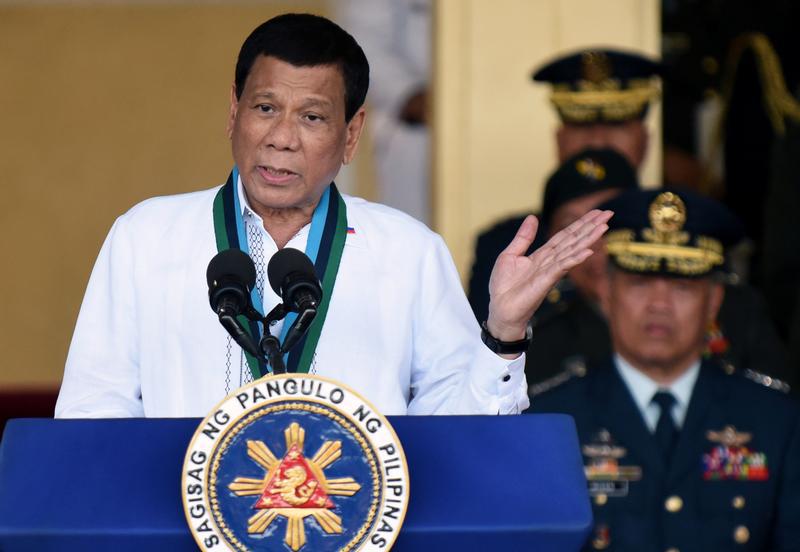No One Is Buying Duterte's Denials Over Drug War Deaths
| Publisher | Human Rights Watch |
| Publication Date | 23 April 2018 |
| Cite as | Human Rights Watch, No One Is Buying Duterte's Denials Over Drug War Deaths, 23 April 2018, available at: https://www.refworld.org/docid/5b39f2e1a.html [accessed 4 June 2023] |
| Disclaimer | This is not a UNHCR publication. UNHCR is not responsible for, nor does it necessarily endorse, its content. Any views expressed are solely those of the author or publisher and do not necessarily reflect those of UNHCR, the United Nations or its Member States. |
US State Department, EU Parliament Slam Killings and Impunity
April 23, 2018 12:26PM EDT Dispatches
Phelim Kine, Deputy Director, Asia Division
 Philippine President Rodrigo Duterte gestures during the change of command ceremony of the Armed Forces of the Philippines (AFP) at Camp Aguinaldo in Quezon City, Metro Manila, Philippines April 18, 2018. © 2018 Reuters
Philippine President Rodrigo Duterte gestures during the change of command ceremony of the Armed Forces of the Philippines (AFP) at Camp Aguinaldo in Quezon City, Metro Manila, Philippines April 18, 2018. © 2018 Reuters
Philippine President Rodrigo Duterte has run up against the limits of his government's campaign of denial and distraction to counter criticism of its ongoing "drug war" killings.
Last week both the United States State Department and the European Parliament issued scathing criticisms of the "drug war" bloodshed and lack of accountability for those deaths. The European Parliament expressed "deep concern" about the deaths of some "12 000 people, including women and children," killed in the drug war to date, and warned that failure to stop the killings may prompt suspension of export trade privileges under the EU's Generalized Scheme of Preferences (GSP+) trade scheme.
The next day, the US State Department's annual human rights report described "a sharp rise" in extrajudicial killings since the start of Duterte's anti-drug campaign in 2016. The State Department implied there is official support at the highest levels of the Philippines government for the campaign, by noting Duterte's "numerous public statements suggesting that killing suspected drug traffickers and users was necessary to meet his goal of wiping out drug-related crime."
The Philippine government reaction was swift. The Philippine National Police chief, Oscar D. Albayalde, questioned the EU Parliament's estimated death toll of 12,000 by stating: "We do not know the basis of the accusations . . . they should list it one-by-one, who those 12,000 victims are." Philippine Foreign Affairs Secretary Alan Cayetano attacked the US State Department report by saying: "We do not need others, who think they know better than us Filipinos, to tell us what to do."
Cayetano's frustration is understandable. He has led government efforts to deflect international criticism of the "drug war" by rejecting outright reports of high death tolls as "alternative facts." And he has dismissed statistical evidence and well-documented accounts of a surge in killings of suspected drug users and dealers since Duterte took office in June 2016 as a baseless "political tactic" wielded by the president's critics.
The US and the European Parliament's criticism of the drug war shows his efforts have failed. And they provide more support for the International Criminal Court's move in February to launch a preliminary examination into the killings that senior Philippine government officials have incited and instigated, but refuse to acknowledge.
Link to original story on HRW website

